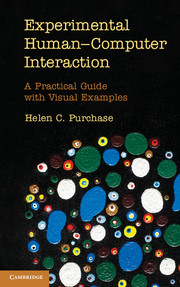Book contents
- Frontmatter
- Contents
- List of experiments
- Acknowledgements
- Preface
- 1 Introduction
- 2 Defining the research
- 3 Experimental procedure
- 4 Data collection and qualitative analysis
- 5 Statistics
- 6 Reporting
- 7 Problems and pitfalls
- 8 Six principles for conducting experiments
- Appendix A1 Independent measures examples
- Appendix A2 Statistical formulae
- Appendix A3 Factor analysis example
- Bibliography
- References
- Index
6 - Reporting
Published online by Cambridge University Press: 05 August 2012
- Frontmatter
- Contents
- List of experiments
- Acknowledgements
- Preface
- 1 Introduction
- 2 Defining the research
- 3 Experimental procedure
- 4 Data collection and qualitative analysis
- 5 Statistics
- 6 Reporting
- 7 Problems and pitfalls
- 8 Six principles for conducting experiments
- Appendix A1 Independent measures examples
- Appendix A2 Statistical formulae
- Appendix A3 Factor analysis example
- Bibliography
- References
- Index
Summary
So, now you have your results, and you want to tell everyone about them. This chapter discusses the way in which you report your research, typically in a research article for an academic conference or journal, or in a dissertation for assessment. In all cases, you need to keep in mind that someone else will be reading what you write, and that this person has not been party to your decision-making process. It is easy to leave information out because it appears obvious.
Reviewers’ concerns
It is the job of reviewers or assessors to make a judgement on the worth of your research, and it is your job to make sure that you have presented it sufficiently well that they can do so. This is true of all research; however, writing experimental papers brings with it its own particular issues:
An experiment focuses on addressing specific research questions: reviewers may not believe that these questions are interesting or important.
An experimental research question could be addressed in many different ways: everyone will have their own idea as to how best to address it.
Different statistical methods are favoured by different people: beware the reviewers who are well versed in statistics when you have not analysed your data using their favoured method!
No experiment can ever be perfect: reviewers can easily find faults on which to base a negative judgement if they want.
Many reviewers have never actually designed and conducted an experiment themselves: they do not always appreciate the amount of work required for running experiments, the difficulty in making appropriate design decisions, or the constraints that apply to experimental design.
- Type
- Chapter
- Information
- Experimental Human-Computer InteractionA Practical Guide with Visual Examples, pp. 182 - 192Publisher: Cambridge University PressPrint publication year: 2012



